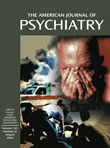To the Editor: We recently completed a study examining the impact of depression and antidepressants on obstetrical outcome
(1). This study was approved by UCLA’s institutional review board, and written informed consent was obtained from all subjects. Although not a primary outcome variable, we found that 46 women with a history of depression had a significantly higher mean number of prior therapeutic (elective) abortions than 16 women without a history of depression (mean=0.78, SD=1.11, versus mean=0.31, SD=0.60, respectively) (robust t=2.11, Satterthwaite df=48.9, p=0.04; Poisson regression χ
2=4.63, df=1, p=0.03). The mean number of prior pregnancies and spontaneous abortions did not differ. Upon closer inspection of the literature, we observed that in two other studies of antidepressants and obstetrical outcome in which abortion-related statistics were reported
(2,
3), similar findings were presented but not discussed. Chambers et al. (2) found that spontaneous abortion rates were comparable but that elective abortion rates were significantly higher in fluoxetine-treated pregnant women (9.6%) in relation to comparison subjects (2.7%) (p=0.002). Kulin et al.
(2) found that women who took selective serotonin reuptake inhibitors during pregnancy had similar rates of prior spontaneous abortions but higher rates of prior elective abortions in relation to comparison subjects (24% versus 13%, p=0.03). While the reason for these differences is unclear, the consistency of the finding is concerning and merits attention.
We speculate that either 1) depression in the first trimester can adversely affect a woman’s view about whether to continue with the pregnancy, and she may choose to have an abortion while in a depressed state; 2) concerns regarding the effects of the pharmacological treatment of depression on the developing fetus may compel her to have an abortion, despite a desire to keep the pregnancy; or 3) concerns about first-trimester antidepressant exposure may lead a physician to discuss the option of abortion with a pregnant woman with first trimester antidepressant exposure. Our study cannot discern which of these factors, or others, played a role in the decision by women to undergo an abortion. Causality cannot be confirmed, and one must also consider that having an abortion may contribute to the onset of depression. However, the process by which women with a history of significant depression make abortion decisions and the role of the psychiatrist working with the obstetrician during pregnancy requires further understanding. If a woman in a depressed state decides to have an abortion, the need for treatment is that much more imperative, especially if her capacity to make such a decision is compromised in this depressed phase.
Given the interest in pregnancy outcome in women with depression and antidepressant exposure and the significant contributions of major depression to disease disability in women of childbearing age, prospective studies are warranted that examine the reasons for the association between depression and abortion decisions.

